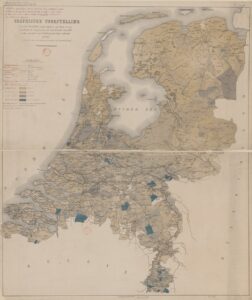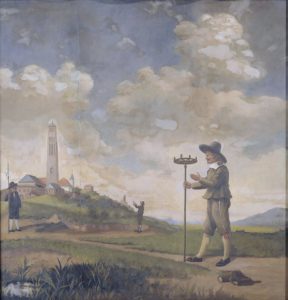A gaarder is a collector, typically of taxes or tariffs. You may come across the term doing research in the province of Holland between 1695 and 1806, when a special tax ("impost") was levied on marriages and burials. The duties that had to be paid depended on the economic circumstances of the bridal couple or the deceased. The records of those taxes are known as the gaarderboeken [collectors' books]. These records can be used as substitutes for marriage and burial records. The actual … [Read more...]
Map of the Week – Children not in School, 1887
This week we are looking at a thematic map from 1887. It shows the percentage of children between the ages of 6 and 12 who were not in primary school. The statistics were shown per municipality. The darkest blue color represents areas where more than 30% of children did not go to school. A zoomable version is available at Gallica. The map shows great differences between parts of the Netherlands. In general, municipalities in the north had higher school attendance than municipalities in … [Read more...]
How to Convert Old Dutch Weights and Measures
In the Netherlands, the metric system was introduced in 1816. Before that time, different areas used different weights and measures. Not only did they use different terms, but the amount indicated by the term could differ from one place to the next. The Meertens Instituut website has an overview of all the different measures in the country, organized by town, province, or type of measure/weight. If you come across a weight or measure in a record, you can use this website to figure out how … [Read more...]
Map of the Week – Roermond after city fire, 1671
This week's map is a drawing of the city of Roermond in 1671. It shows the effects of the city fire of 31 May 1665. The houses with the blue roofs were spared, the ones with the red roofs had been destroyed and rebuilt. Fires were a constant threat to our ancestors. In the seventeenth century, many houses were still built with or from wood. Increasingly, cities passed ordinances requiring houses to be built out of brick, or fill the panels between the timber frames with brick, and to use … [Read more...]
Dutch term – Stamboek
A stamboek is a military service register. Outside genealogy, the word stamboek is also used for a studbook, a register of the pedigree of purebred animals. This usage has led several genealogy websites, including Ancestry, to mistranslate the stamboek military records as "studbooks." … [Read more...]
Map of the Week – Overijssel, 1659
In 1659, the famous mapmaker Joan Blaeu published his world atlas Tooneel des Aardrycks [Display of the Realm of Earth]. The archives in Leiden have made their atlas available online. This week we are looking at his map of Overijssel. It shows the IJssel river on the west, which connected the to the North Sea in the north and the Rhine river in the south, bringing prosperity to the area. The area of Twente in the east shows different cities, including Oldenzaal ("Oldenzeel" on the map), where … [Read more...]
Dutch Genealogy News for July 2024
Here is an overview of the new sources, projects, and other news announced in the past month. Sources The Staten van Oorlog [War Rosters] 1595-1795 are now available via the Brabants Historisch Informatie Centrum. These rosters include information about various people who held important positions in the Dutch army, such as officers who led companies, watch commanders, ministers, etc. The rosters provide detailed information about the structure of the army at the level of individual … [Read more...]
Map of the week – Reclaimed land in North Groningen, 1685
This week's map shows us land that was reclaimed from the sea by building a dike in the north of the province of Groningen. This includes land in the parishes of Hornhuizen, Wierhuizen, Pieterburen, Westernieland, Saaxumhuizen, Den Andel, Breede, Warffum, Usquert, and Uithuizen. The map was created in 1685 and lists all the owners of the land. Maps like this can be a great source of information to learn about property owned by your ancestors. … [Read more...]
Map of the Week – Plan to drain the South Sea, 1891-1892
In 1891, Cornelis Lely came up with a plan to claim more land from the sea. His ambitious plan involved building a dike between North Holland and Friesland to close off the Zuiderzee [South Sea]. That would make it possible to reclaim large sections of land and create a fresh water lake, the IJsselmeer. This plan formed the basis of a major water engineering project carried out in the first half of the 1900s. In 1932, the dike was completed. The southern (Flevopolder) and eastern (Noordoost … [Read more...]











